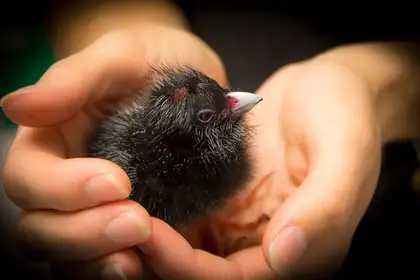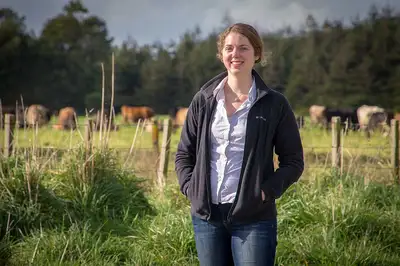
A baby pukeko at Massey's Wildbase Hospital.
This World Veterinary Day, Massey University researchers are highlighting the importance of vaccinations for the health and wellbeing of animals and humans.
The day represents the opportunity to celebrate the contributions of veterinarians to the health of animals and society, with this year’s theme – the value of vaccination.
Head of the School of Veterinary Science Professor Jon Huxley says, “Vaccination programmes have been a global success, eradicated or controlled some of the most distressing of animal diseases. From companion animals to livestock on farms, vaccination is a key preventive measure to ensuring not only animal health, but human health as well. Much of the work we do focuses on training our students on preventative medicine and the importance of vaccination programmes, educating our clients and the public, but also conducting world-leading research into the effectiveness and improvement of these programmes through our expert staff within the school.”
While Massey is researching and working to spread the importance of vaccinations in companion animals, Professor Huxley says it is also highly important for the primary industries and in our country’s native wildlife.
Wildlife
Vaccines play an important role in the management and conservation of wildlife, and this work occurs at Massey’s Wildbase Hospital. In some countries, vaccine programmes in wildlife are used to minimise the spread of infectious diseases. For example, there is ongoing research into using rabies vaccines in wildlife to prevent the spread of this lethal disease into people and livestock.
Massey’s Wildbase veterinarians use vaccines to protect critically endangered animals from infectious disease. Wildbase Hospital is carrying out research on the use of vaccines against poxvirus to protect the critically endangered shore plover and assist programmers to vaccinate takahē and kākāpō against an infectious bacterial disease called erysipelas. This bacteria is carried onto offshore islands by seabirds and this means vaccination is the most effective strategy to protect these species that are hovering on the edge of extinction.

Dr Carolyn Gates.
Primary Industries
Massey experts are tackling key diseases threatening both human and animal health.
Dr Carolyn Gates is one of many researchers working on a national campaign to help fight bovine viral diarrhoea (BVD) virus in cattle through the strategic use of diagnostic tests and vaccines.
“Vaccines are an important weapon in our infectious disease arsenal because they teach the body’s immune system how to fight off invading viruses and bacteria naturally without the use of drugs,” Dr Gates says. “For BVD, vaccinating cows and heifers that are at risk of being exposed to the virus during pregnancy can prevent serious complications like abortions, birth defects, and persistent infections in calves that have a big impact on animal health and welfare.”